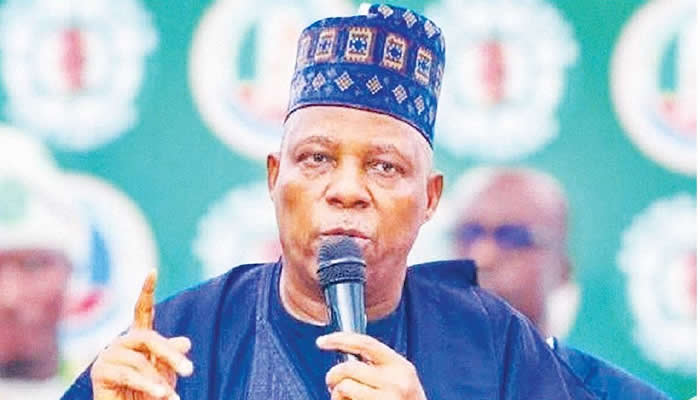Vice-President Kashim Shettima has assured Nigerians that the current administration will continue to provide the values of the democratic systems by fixing major weaknesses of the economy, securing communities, fighting corruption strengthening the independence of the judiciary and improving national cohesion.
Shettima stated this in Abuja on Monday at the national conference on strengthening democracy in Nigeria, themed: “Strengthening Nigeria’s democracy: Pathways to good governance and political integrity,” organised by the African Centre for Leadership, Strategy and Development.
Shittima, represented by his Special Adviser on political issues, Hakeem Baba-Ahmed said while democracy is not a perfect system, it is still considered the best form of government compared to others.
“I would like to assure Nigerians that our administration is acutely aware of many concerns over our direction and goals, particularly given the difficulties which some of our policies inevitably generate. We are involved in correcting many defects in our economy and approaches to securing the citizens. We have been honest to admit that this transition from a broken past and a promising future will not be without a price, and we will remain focused on easing the pain and ensuring that we do not take our eyes off the goals.
“We will listen and adjust where necessary, and we will account our stewardship in all matters our challenging democratic systems demands. I am convinced that Nigeria shall rise again, answer to its full potential and lead the way to a future that has learnt lessons from a difficult past into a world in which our country will be a key player, and our young will be active champions of a democratic system because it speaks to them.
“It has been said many times that democracy is an imperfect system, yet superior to all others. We will continue to seek to provide evidence of the values of the democratic systems by, among others, fixing major weaknesses of our economy, securing our communities, fighting corruption, supporting free and fair elections, strengthening the independence of the judiciary and improving national cohesion. I would like to appeal to fellow Nigerians to join us in this challenging but ultimately rewarding journey,” he said.
According to him, the current administration has a major interest in the quality of the democratic system and a key responsibility in improving the elements that constitute the democratic system.
“This reminds us that we owe our current positions to the democratic process, and it is our duty to continually police its effectiveness and impact on the lives of all Nigerians,” he stated.
He noted that there is a huge responsibility on the shoulders of elected leaders in Nigeria to market democracy in terms of the quality of governance, their conduct, and disposition towards the rule of law and respect for the welfare and security of citizens.
“Nigerian democracy must mean a lot more than asking Nigerians to line up every four years to elect leaders. It must mean, in practical terms, that leaders commit to the demands of elected leadership in very transparent manners, that mandates given to them to govern make them servants to the interests of the people, custodians of their assets, and protectors of their interests. The best leaders are people who exercise power only to promote the interests of their people.
“These interests include making laws that are consistent with the economic welfare and security of the citizen; that the judiciary is free from interference and corruption; that institutions and structures of governance function with the highest standards of efficiency and integrity; that citizens’ voices are heard and respected not just during elections; and the basic rules of competition between parties and interests are respected,” he added.
In his keynote address, the former Vice President of Ghana, Dr Mahamudu Bawumia, said despite the imperfections of democracy, it remains the preferred form of governance that can guarantee individual liberties and rights.
He, however, stated that for democracy to thrive and to be strengthened, the ambition for the country must be paramount and must supersede the ambition for oneself.
“Elections are not do-or-die affairs. That’s what we must understand. The right of the citizenry to choose leaders in a free, transparent manner is sacrosanct and remains one of the most vital angles of a true democratic dispensation.
“By choosing and or changing leaders through the ballot box, the vote necessary is not sufficient to guarantee a true flourishing democratic culture,” he emphasised.
He noted that one of the most important determinants of a flourishing democracy is the quality of institutions capable of guaranteeing rights, including property rights, and checking the wanton abuse of power.
According to him, the best democracy is the one that delivers public goods and services effectively and efficiently and creates opportunities for citizens whilst making conscious efforts to leave no one behind.
The Executive Director of the African Centre for Leadership, Strategy & Development, Dr Otive Igbuzor highlighted that the purpose of the conference lies in a vision for a democracy that is genuine, resilient, and inclusive.
“As many of us know, Nigeria’s democratic journey, though spanning 25 years of uninterrupted civilian rule, is beset by structural and functional flaws. These range from electoral malpractices, ineffective political parties, and weakened governance structures to pervasive corruption and a concerning erosion of public trust.
“Despite decades of democratic practice, the realities faced by Nigerians today often reflect disillusionment rather than hope. The goal of this conference, therefore, is to reignite hope, rebuild trust, and lay out a road map toward a strengthened democratic system that serves all Nigerians with integrity and accountability,” he said.
